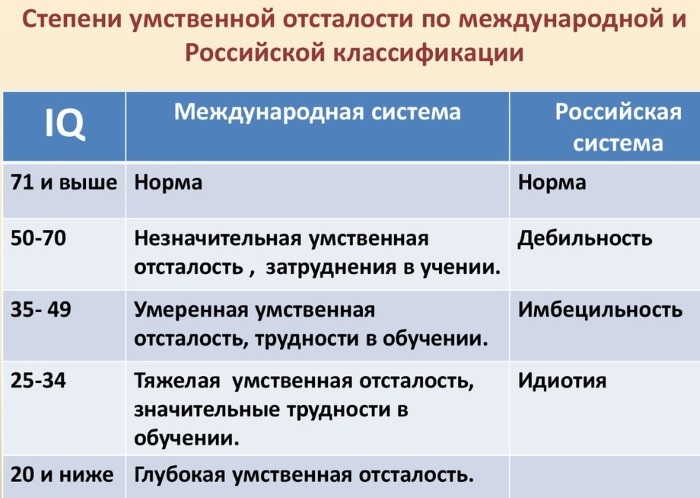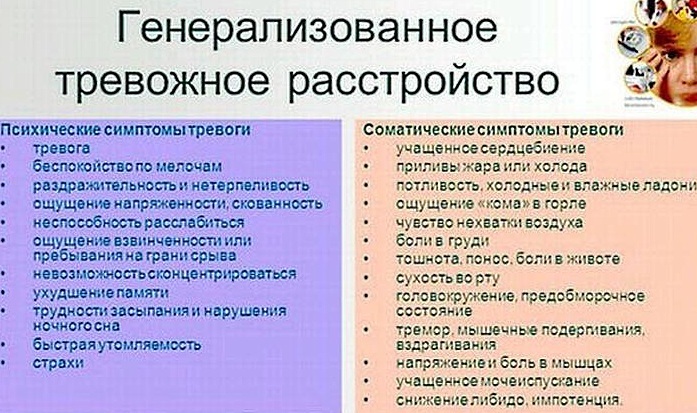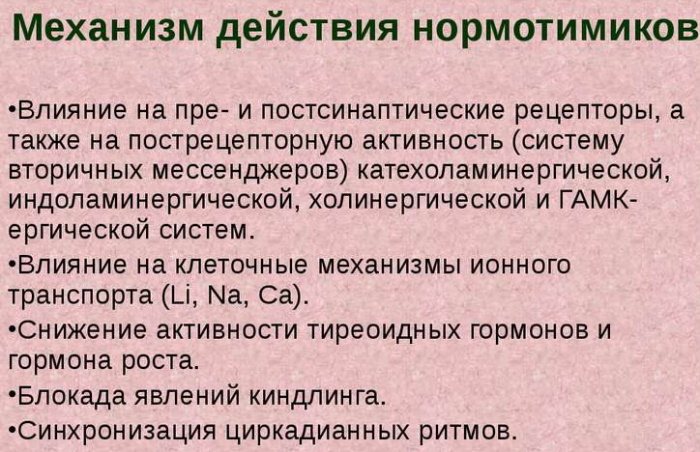In medicine bipolar disorder is a condition in which a person experiences sudden mood swings. However, this is far from the only sign of bipolar disorder.
Patients (symptomatic in children, adolescents, and adults) with bipolar disorder may experience a state of mania, that is, those moments when a person says strange things and does rather stupid actions.
This is often due to the occurrence of hallucinations, which can provoke aggressive behavior or very frighten the patient. Gradually, this condition is replaced by long-term depression, which turns into mania, but to a more dangerous degree (when the patient completely lacks his own opinion).
Record content:
-
1 Degrees and stages
- 1.1 Manic phase
- 1.2 Depressive phase
- 1.3 Dysphoric mania
-
2 Symptoms
- 2.1 Cognitive impairment
- 2.2 Differences between signs of adolescence and bipolar disorder
- 3 Causes
- 4 Diagnostics
-
5 Treatment methods
- 5.1 Features of cognitive-behavioral psychotherapy
- 5.2 Supportive care
- 6 Alternative treatment
- 7 Possible complications
- 8 Bipolar Disorder Videos
Degrees and stages
This pathology is quite dangerous, since in the absence of treatment, more serious psychological and mental problems can develop. Experts distinguish several stages and degrees of bipolar disorder in adolescents, the symptoms of which are quite pronounced.
Manic phase
At this stage, the so-called triads of signs are registered. These are three manifestations that are most often diagnosed in patients, namely: increased emotionality, too fast pace of thinking and physical activity. However, it should be noted that in adolescence, such triads are very rarely diagnosed.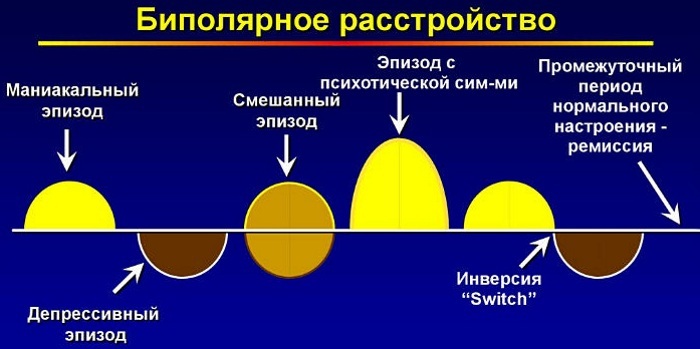
As a rule, the stage of mania manifests itself in the form of euphoria or emotional excitement, unreasonable aggression. This can be accompanied by defiant behavior, rather rude communication, boorish statements and disrespectful attitude towards relatives and friends, regardless of their age.
Children and adolescents feel a kind of rush of mental energy. They begin to perceive their abilities as something extraordinary.
The child wants to participate in various Olympiads, city competitions, go to sports sections or attend all possible circles. At the same time, he does not have a certain preference and the feeling that the teenager wants to try absolutely everything, at once and at the same time. During this period, in the manic phase, an increase in self-esteem occurs.
The teenager is sure that he deserves only the first places and in case of a loss he experiences serious problems in the form of aggressive behavior. However, at the same time, patients do not make any far-reaching plans. Gradually, they abandon all their undertakings.
Bipolar disorder in adolescents, with symptoms similar to those of transition, may initially manifest as vagrancy. The child finds a reason to leave home and live on the street for a while. Also, during this period, a teenager can make friends with a bad company and start using alcohol and other illegal drugs.
At this stage, promiscuous sexual activity often begins, which is also characteristic of the manic phase. The main problem of diagnosing the condition is that all the described signs are also characteristic of standard changes in adolescence.
Depressive phase
Bipolar disorder can also manifest as depression. It is quite easy to determine, since the mood of a child or teenager deteriorates. He feels depressed, especially towards evening. The younger the patient, the less pronounced the generally accepted signs of a depressive state will be.
Therefore, experts call such manifestations of unconventional depression, which can be identified based on the characteristics and behavioral habits of the child. For example, he begins to commit acts that are aimed only at doing something in spite of or in spite of.
For no apparent reason, the child is constantly in a state of anger towards the whole world. His school performance is deteriorating. The teenager may stop attending classes altogether. In order to anger his parents and his environment, he may start using illegal drugs, even if he does not receive any satisfaction.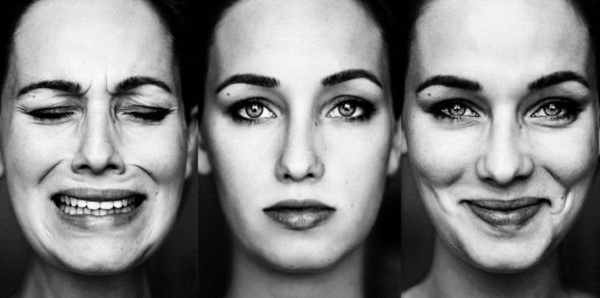
The child shows the first signs of complete indifference, he stops making contact even with the closest friends and spends more time alone.
Bipolar disorder in adolescents (it is recommended to discuss symptoms of this condition with a doctor) can manifest itself as problems with sleep. As a rule, adolescents with bipolar disorder sleep for a very long time, but they cannot get enough sleep. They constantly complain of fatigue and loss of energy.
Another manifestation of the depressive phase of bipolar disorder is envy towards classmates or acquaintances who seem to be more successful to the adolescent.
There is a depressive state of the hypochondriacal type. For example, a teenager begins to complain about his health condition and is sure that his situation is very bad. He constantly asks his parents to take him for medical examinations and tests. At the same time, the child constantly tries to evoke a feeling of pity in relation to himself, may cry and withdraw into himself.
The depressive state is often accompanied by the so-called depersonalized component. This means that the child completely disappears any limitation of his own "I".
The teenager ceases to perceive smells, colors, constantly says that the proportions of his body are violated. The child claims that he has too large a nose, weight, long arms or legs. Self-esteem gradually decreases, and the patient begins to feel inferior.
Such a condition is dangerous in that it can lead to the development of nervous exhaustion. Often against the background of this, adolescents begin to additionally suffer from anorexia, as well as dystrophy. If a child develops too much depression, then suicidal thoughts often arise against her background.
It is extremely important to notice in a timely manner that something is wrong with the child, since in most cases, it is the depressive stage of bipolar disorder that causes suicide among adolescents. This period is also superimposed on the standard signs of adolescence, when the child becomes more impulsive and aggressive.
Dysphoric mania
The condition is a mixture of mania and a depressive phase. This stage is characterized by affective disorder. The child is depressed, experiencing constant irritation. He complains that he is uncomfortable in absolutely any society (regardless of whether there are peers or older people next to him).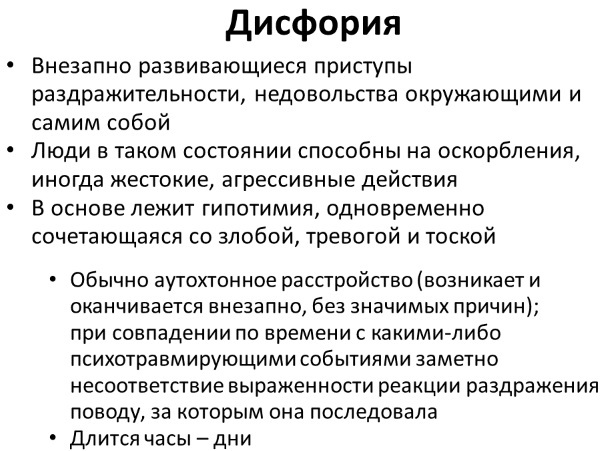
At this stage in the development of bipolar disorder, the adolescent becomes very distrustful. When parents describe his condition when talking with a psychologist, they say that the child seems to be constantly preparing for war. This is not far from the truth, since at this stage teenagers often start to fight and enjoy violence against other people.
A teenager with bipolar disorder is unable to control his behavior or mood at this stage. Emotional outbursts can last for hours.
Children in adolescence are a dangerous risk group that is most prone to bipolar disorder. It is extremely difficult to identify the sequence of development of the stages or stages of this disorder. Sometimes the phases change very quickly or inconsistently. For example, a child may be happy in the morning, depressed in the evening, and ashamed towards night.
Symptoms
The adolescents themselves who coped with this symptom say that initially they felt rather emotional individuals, they experienced fear and periodically suffered from insomnia.
As bipolar disorder progresses, mood deteriorates and teens become depressed. They complain about so-called peak experiences (when problems arise in the head that have not caused absolutely any experience before).
Suddenly they feel more untied, as they feel like their lives are wasted and at least something needs to be done. Gradually, they get rid of the barriers of society, they can break the law.
Bipolar disorder can literally change the inner world of a teenager. He begins to pay attention to those things that he has never noticed before. Thinking changes. For example, a teenager may at first get very interested in painting and start painting, but one day he wakes up and now prefers to be the author of some science fiction novel.
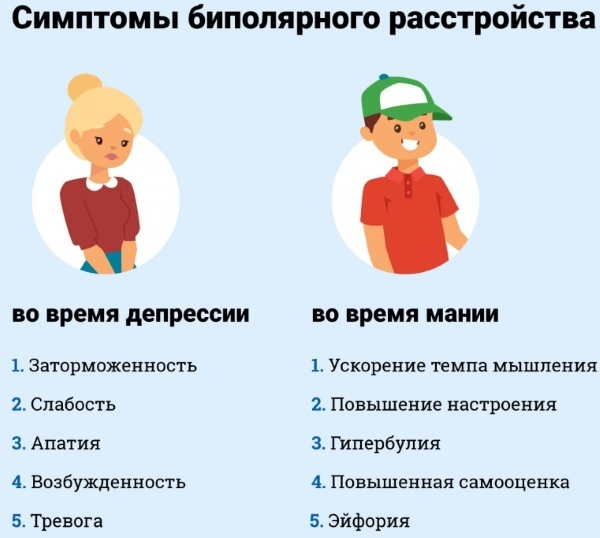
At the same time, there is a complete change in the appearance, wardrobe. At such times, teenagers can have memory lapses.
At the same time, the child is convinced that he has absolutely no problems. He's just enjoying his life. Gradually, such situations are aggravated, and the teenager already begins to experience constant shame for what he did or does not remember at all how he offended other people. Gradually, the condition changes to the completely opposite and the patient falls into serious depression.
If a child suffers from a full-blown disorder that is accompanied by psychotic symptoms, then he may not sleep for a week. It is no secret that such a condition is extremely dangerous for human health, since in addition to the general depletion of the body, the patient can behave recklessly against the background of hallucinations.
Cognitive impairment
Bipolar disorder in adolescents is often characterized by memory lapses. These symptoms are related to cognitive disorders. They begin after several phases of bipolar disorder. The child may unconsciously forget the assignment given by his parents, or constantly complains that he has a fog in his head.
Typically, cognitive impairment often begins at the same time as mania or depression. As soon as the adolescent's condition stabilizes, this manifestation disappears. If a patient has been suffering from bipolar disorder for a long time, then cognitive impairment can haunt him throughout his life.
For example, such people often forget the dates of birth of their loved ones, they have to be constantly reminded of an upcoming meeting, trip and other events. With cognitive impairments, it is very difficult to perform work duties without writing them down. At the same time, the danger lies in the fact that the symptoms can worsen very strongly and sharply.
Differences between signs of adolescence and bipolar disorder
The symptoms of both manifestations are very similar. But, if the signs of adolescence subside over time, then bipolar disorder only develops more. To independently diagnose the initial signs of bipolar disorder, it is worth comparing its manifestations and very similar behavioral features during the transition period.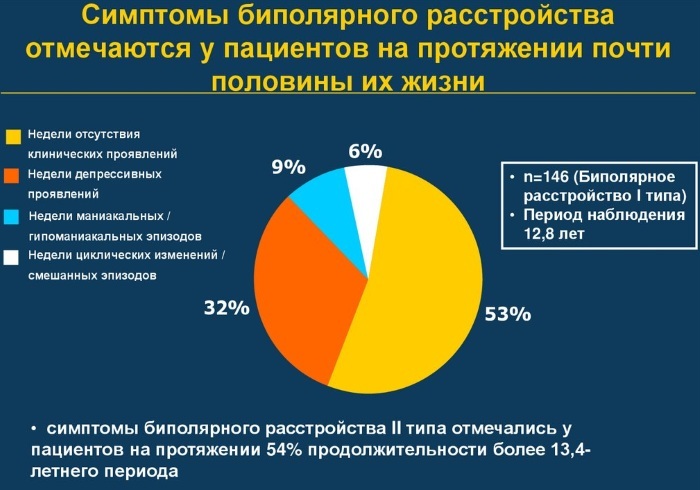
| Symptoms in a Difficult Teenager | Symptoms of a teenager suffering from bipolar disorder |
| Increased activity, feeling of joy | The teenager can't calm down |
| Talking about pretty radical changes | Radical, thoughtless and completely illogical actions |
| Likes to experiment | Risks |
| Constantly changes his mind | Can't ever make any decision |
| Falls asleep late | Stays awake all night, sometimes stays awake for several days in a row |
| In case of change, begins to behave capriciously | Nervous excitement appears for no reason |
| Rarely listens to parental advice | Advice does not happen at all, starts to lead aggressively |
| It is often unpleasant to communicate with him | It is simply impossible to communicate |
| Itself calms down after a while after the tantrum | Can't calm down, hysterics can last for several days |
| Can threaten | Hurts |
| Shows signs of individuality | Behaves and dresses provocatively |
| Arguments his choice | Due to the lack of arguments, he can use physical force in relation to someone who does not agree with him |
| Is angry with family members, with friends on good terms | Behaves violently with family and friends |
| Shows signs of sex drive | Sexually aggressive |
| Infantile, not ready to be responsible | Reckless, does life-threatening acts |
| Can lock herself in her room | Runs away from home |
| Begins to experiment with alcohol, illegal drugs | Suffers from a full-fledged addiction |
| Periodically unable to concentrate | Very often unable to concentrate |
The line between these two states is very thin, so it is difficult to independently understand whether a child has bipolar disorder.
Causes
Bipolar disorder in adolescents, which is more likely to show symptoms at school age, is difficult to diagnose even for a specialist. This is due to the fact that the phases and degrees of development of this state are not cyclical. The condition can change abruptly and at the same time be either pathological or acute.
The causes of bipolar disorder have not yet been fully understood.
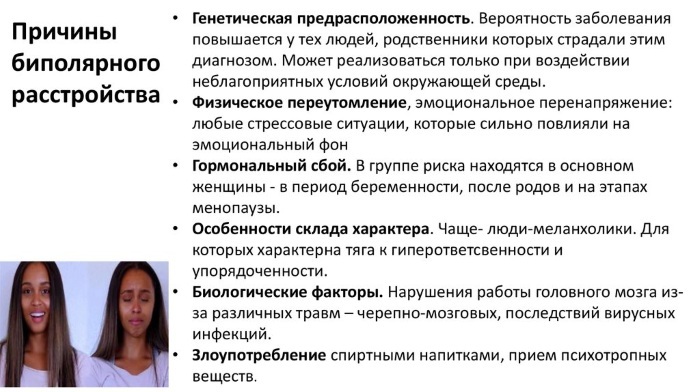
However, experts identify three main factors that affect such disruptions in the mental state of older children:
- Heredity. In more than 50% of cases, doctors note that one or both of the parents of a teenager also suffered from bipolar disorder. According to research, a change in the genome on chromosome 11 is responsible for this.
- Features of the personality type. In this case, experts prefer to highlight character accentuations. This means that people with a certain psychotype have a predisposition to bipolar disorder. For example, a similar pathology can occur in melancholic, suspicious or anxious adolescents who are unstable.
- Hormonal changes in the body. As you know, in adolescence, children go through certain changes in the body. Changes in the amount of a hormone can affect the behavioral characteristics of children.
The psyche in adolescence is unstable, so it is very easy to provoke a disorder. For example, against the background of some stressful situation or if the child began to take illegal drugs, psychotropic drugs, alcohol. The reason may be physical fatigue, lack of normal sleep and nutrition. Sometimes bipolar disorder develops simultaneously with pathologies of the nervous system.
Most mental illnesses are the result of a complex of causes. A factor that provokes such changes in human behavior may even be the environment or chemical processes occurring in the tissues of the human brain.
Bipolar disorder is clearly a comorbid disorder. This means that this condition is very often accompanied by additional diseases.
There is an up to 80% chance that people with bipolar disorder will also be diagnosed with attention deficit hyperactivity disorder, anxiety disorder, or destructive behavior problems. Due to bipolar disorder, changes in biochemical bases occur, that is, people begin to show a tendency to use psychotropic substances.
Diagnostics
Bipolar disorder in adolescents (it is advisable to observe symptoms for some time and prescribe in notebook of all the strange habits of the child) does not require blood tests or other standard laboratory research. No data can be obtained by scanning the brain, by x-rays and other standard diagnostic methods.
The main stage of diagnosis is the collection of anamnesis. The doctor necessarily talks first with the teenager himself, and then with his parents or guardians. At this stage, it is very important to describe in detail all the episodes of changes in the physical and emotional state of the child.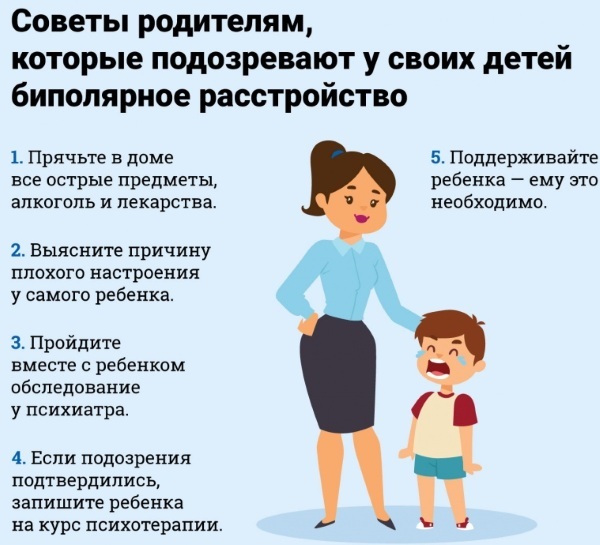
It is equally important to tell the family's medical history and describe how the teenager is spending the day (how well he sleeps, eats, and has friends).
It is taken into account whether the parents of a teenager themselves suffer from drug addiction, alcoholism, ADHD and other pathologies of a psychological or mental type. Sometimes, in order to clarify the diagnosis, the doctor may issue a diary to the parents or independently observe the patient.
If a teenager shows signs of too aggressive behavior or has pronounced suicidal thoughts, then hospitalization is recommended. This is necessary, first of all, in order to protect the teenager himself. Often, doctors conduct additional studies that can reveal secondary pathologies.
A psychotherapist, clinical psychologist, and cognitive-behavioral therapist can diagnose bipolar disorder. As a rule, there are no such highly specialized doctors in district polyclinics. Therefore, you will have to go to larger medical centers or private clinics. The cost of examination and initial diagnostics can vary greatly in cost (from 300 to 3500 rubles).
Treatment methods
It all depends on how the disease progresses. If the doctor notes that the pathology has developed to a critical level, then he is determined by the severity of relapses, their duration, as well as the frequency of changes in the phases of bipolar disorder.
If changes for the better are not observed at all (even for a short period of time), then in this case they may to be violated vital functions of the body with the addition of a psychotic component in the form of delirium or hallucinations.
In this case, the doctor may prescribe supportive medications or prescribe medications that help calm and stabilize the patient. During the treatment, medical supervision is constantly carried out.
If the patient's condition does not improve, then in this case, intensive therapy is carried out in a hospital setting. As a rule, the main work is done by a psychotherapist. Experts give preference to cognitive-behavioral psychotherapy, which is the most studied, and also effective for the formation of correct thinking when it changes.
The main advantage of cognitive behavioral therapy is that the course of treatment is rather short and has a quick effect. If the situation is not critical, then this method can not only stabilize the patient, but also correct the so-called erroneous module of his thinking.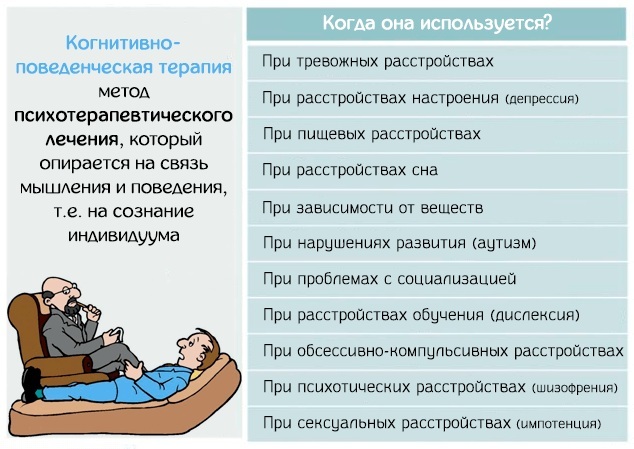
In some cases, other types of psychotherapeutic measures are considered. For example, dialectical behavioral therapy has shown good results (in fact, it is an improved form of cognitive-behavioral treatment).
Such a program was designed to treat adolescents with borderline personality disorder. The course of such treatment lasts 3 months. After that, the patient has a decrease in symptoms of depression, which avoids adolescent hospitalization due to exacerbation of bipolar disorder.
Features of cognitive-behavioral psychotherapy
- In the course of working with a patient, the doctor helps him develop several important skills:
- Mindfulness. This means that the patient must develop instant awareness and also learn to control thoughts, emotions and their behavior.
- Distress (resistance to stress). And at this stage, the specialist teaches the patient to regulate his thoughts, as well as adhere to the norms of accepted social communication. This allows the teenager to better communicate not only with his peers, but also with parents, teachers and other people.
- Acceptance and responsibility. At this stage, the doctor conducts a series of sessions during which the patient learns not to run away from difficult emotions. and unpleasant thoughts, while learning to solve them and get rid of fear and emotional pain on one's own. The teenager should understand that such thoughts are the norm for his age. He must pass this moment and learn to regulate his attitude to his thoughts.
- Perception of thoughts, as well as emotions indirectly from oneself. The patient should not concentrate on the fact that some impartial things are said about him. must be able to perceive it as separate pictures or words that are not able to change it a life.
Supportive care
After the manic or depressive phase has been arrested, the task of the psychotherapist is to maintain the state of remission for as long as possible.
For this, antidepressants can be used, but they are prescribed only for particularly severe episodes of the condition. As a rule, doctors give preference to the new generation of depressants. The drug and its dosage are selected on a strictly individual basis.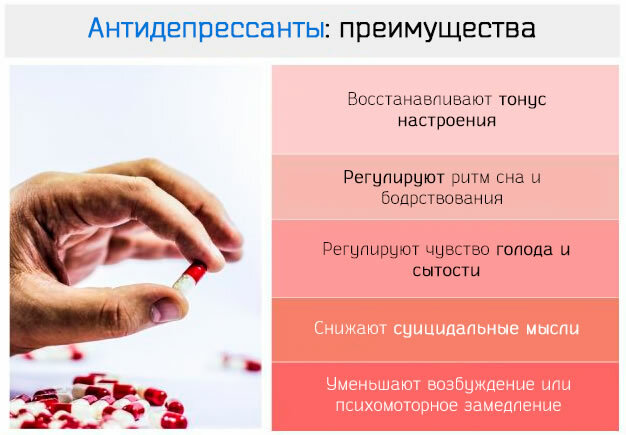
Your doctor may prescribe a mood stabilizer as monotherapy or combine it with sedatives (sedatives) or atypical antipsychotics. Combining antidepressants with normotics is strictly prohibited.
Alternative treatment
These methods are used only as a complementary treatment for bipolar disorder. They can only be used if the alternative methods are approved by the attending physician. Otherwise, they can provoke an exacerbation.
Yoga and acupuncture are considered as additional methods of treatment. Homeopathy is only effective for mild depression. Herbal medicine, rubdowns, hydrotherapy can also alleviate the patient's condition. Massage has a good effect on the psychological state. It also increases stress resistance indicators.
Possible complications
If you do not provide help to a teenager in a timely manner, then his condition can reach a critical point, there is a risk of suicide. Also, adolescents with bipolar disorder often become highly addicted to alcohol and drugs.
There is a risk of developing profound mental illness. Unreasonable aggressive behavior to a neglected degree can lead to the fact that the teenager breaks the law, brings harm to someone.
Therefore, bipolar disorder in adolescents is best noticed as early as possible. If the child shows symptoms of too strong aggression and does not make contact with anyone, then it is better to visit a psychotherapist, and if necessary, more narrowly specialized specialists. The sooner treatment is started, the less the consequences will be.
Bipolar Disorder Videos
Malysheva on bipolar disorder:

